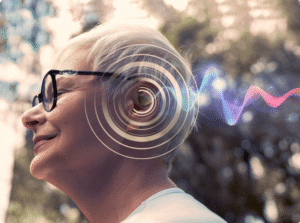Have you ever left a social gathering feeling mentally exhausted—even though you didn’t talk much? Maybe it was a family dinner, a team meeting, or a birthday party. If your ears felt “tired,” your brain foggy, and you needed quiet time to recover, you’re not alone.
This experience is called listening fatigue, and it’s more common than most people realize—especially among adults with early-stage hearing decline.
Listening fatigue isn’t just emotional—it’s neurological. In this article, we’ll explore what causes this type of auditory burnout, why it happens more in social environments, and how to reduce the impact using evidence-based strategies.
What Is Listening Fatigue?
Listening fatigue refers to the mental exhaustion that comes from prolonged effortful listening. Unlike physical tiredness, it’s rooted in the brain’s constant work to decode speech—especially in noisy or complex environments.
A report from Vanderbilt University describes it as a multi-layered experience, involving cognitive strain, emotional depletion, and even physical fatigue among people with hearing difficulties.
It’s not just about hearing—it’s about processing. When your ears don’t catch everything, your brain works overtime to fill in the gaps. Over hours, this drains focus, energy, and even mood.
Why It Happens in Social Situations
Noisy environments make your brain hustle.
Social settings like restaurants, family gatherings, or group discussions are filled with:
-
Background noise
-
Multiple conversations at once
-
Rapid speech
-
Overlapping voices
This increases the listening load, forcing your brain to filter sound, interpret meaning, and stay socially engaged—all at the same time.
Scientific Insights
Recent research continues to underscore the cognitive toll of untreated hearing loss. A study in Ear and Hearing found that individuals with hearing impairment report markedly higher levels of mental fatigue during routine communication—especially in social settings, where background noise and multiple speakers increase the effort required to follow conversations. Over time, this burden often leads to social withdrawal, reinforcing feelings of loneliness and emotional exhaustion.
A 2024 study published in JAMA Otolaryngology added that even before hearing loss reaches clinical thresholds, older adults report significantly greater fatigue and social isolation, suggesting that the impact begins earlier than many realize.
Fortunately, the evidence also points to a solution. A peer-reviewed paper in Trends in Hearing concluded that hearing aids and assistive technologies can meaningfully reduce listening effort, leading to greater energy, participation, and cognitive resilience—especially in group environments.
The takeaway? Supporting your ears doesn’t just enhance sound—it protects your mind.

How to Reduce Listening Fatigue
Here are practical, research-backed strategies you can apply immediately:
1. Control the Noise
Choose quieter venues. Sit closer to the speaker. Lower TV volumes. Every decibel counts.
2. Take Breaks from Sound
Step away briefly during social events. Even 5 minutes in a quiet space can reset your mental bandwidth.
3. Use Assistive Hearing Tools
Hearing aids, amplifiers, or directional mics have been shown to lower mental fatigue and increase participation in group settings.
4. Mind Your Energy
Listening is work. If you’re already tired, sick, or stressed, the fatigue comes faster. Prioritize rest, hydration, and quiet time before social exposure.
5. Support Your Auditory System
Your inner ear and auditory nerve rely on circulation, neurotransmitters, and antioxidant protection to work efficiently. That’s where nutrition—and the right supplement—can make a difference.


